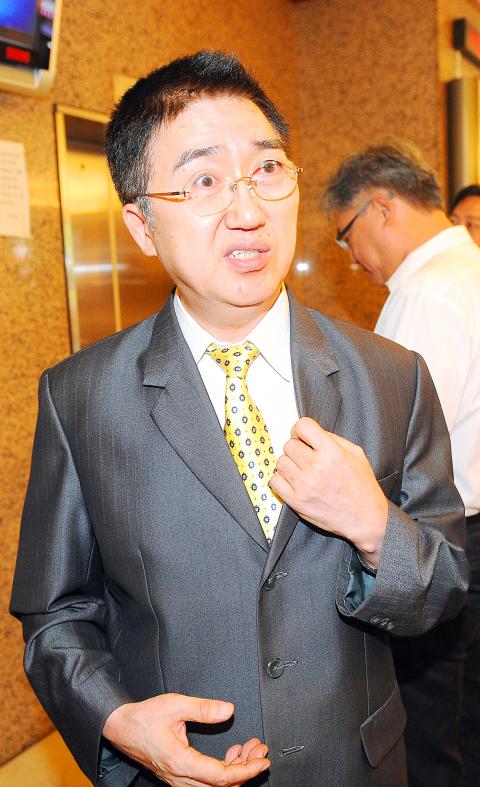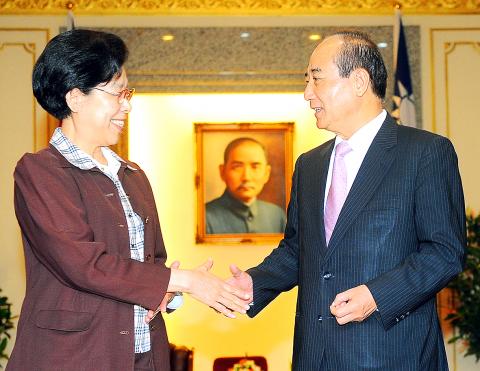Chinese Nationalist Party (KMT) caucus whip Lin Hung-chih (林鴻池) tendered his resignation yesterday after 11 of the 29 Control Yuan nominees recommended by the Presidential Office were rejected by the legislature, where the KMT holds a majority.
At press time last night, it had not been confirmed whether President Ma Ying-jeou (馬英九) accepted Lin’s resignation. Ma, who is also the KMT chairman, is widely expected to ask Lin to stay in his post for the next round of nominations to fill the 11 slots.
Lin yesterday said that as the “frontline commander,” he was taking responsibility for the unexpected outcome of the vote.

Photo: Wang Min-wei, Taipei Times
Lin and the KMT caucus blamed outgoing Control Yuan President Wang Chien-shien (王建煊) for the “surprising outcome” on Tuesday night, after it became clear that KMT lawmakers had failed to vote in line with the party’s wishes.
Not only was incoming Control Yuan president Chang Po-ya’s (張博雅) nomination confirmed by only a hair’s breadth, 11 of the 27 candidates for Control Yuan members were voted down by the legislature, despite Ma’s insistence on a “complete passage that leaves no one behind.”
At a press conference held immediately after the votes had been tallied, Lin said that Wang’s accusations of wrongdoing — including accepting gifts — by incumbent members affected the vote for those seeking a second term.

Photo: Wang Min-wei, Taipei Times
Lin said he respected the outcome of the vote, but regretted that “some of nominees did not have enough time to clear the doubts against them.”
Meanwhile, KMT headquarters laid the blame on the Democratic Progressive Party (DPP), with KMT Culture and Communications Committee Director Fan Chiang Chi-tai (范姜基泰), saying late on Tuesday that the disappointing outcome was a result of the DPP’s “deliberate fabrication of false information about some nominees.”
Chang, the new helmswoman of the Control Yuan, visited Legislative Speaker Wang Jin-pyng (王金平) and the two party caucuses yesterday.
Asked about the low support she garnered, she said it was “the product of political wrestling.”
Chang also expressed her concern about the operation of the institution when DPP caucus whip Ker Chien-ming (柯健銘) called on Ma not to submit a new list of nominees to fill the 11 positions.
She said it would be harder to impeach officials given the current number of members.
Ker said it was a problem that could be easily fixed.
“What matters now is to rebuild the institution’s image. Ma’s next round of nominees would not be the best choice and they would be nominated just for the sake of being nominated,” Ker said.
Presidential Office spokesperson Ma Wei-kuo (馬瑋國) said Ma would have a new list of nominees before the next legislative session starts.

CHAOS: Iranians took to the streets playing celebratory music after reports of Khamenei’s death on Saturday, while mourners also gathered in Tehran yesterday Iranian Supreme Leader Ayatollah Ali Khamenei was killed in a major attack on Iran launched by Israel and the US, throwing the future of the Islamic republic into doubt and raising the risk of regional instability. Iranian state television and the state-run IRNA news agency announced the 86-year-old’s death early yesterday. US President Donald Trump said it gave Iranians their “greatest chance” to “take back” their country. The announcements came after a joint US and Israeli aerial bombardment that targeted Iranian military and governmental sites. Trump said the “heavy and pinpoint bombing” would continue through the week or as long

TRUST: The KMT said it respected the US’ timing and considerations, and hoped it would continue to honor its commitments to helping Taiwan bolster its defenses and deterrence US President Donald Trump is delaying a multibillion-dollar arms sale to Taiwan to ensure his visit to Beijing is successful, a New York Times report said. The weapons sales package has stalled in the US Department of State, the report said, citing US officials it did not identify. The White House has told agencies not to push forward ahead of Trump’s meeting with Chinese President Xi Jinping (習近平), it said. The two last month held a phone call to discuss trade and geopolitical flashpoints ahead of the summit. Xi raised the Taiwan issue and urged the US to handle arms sales to

State-run CPC Corp, Taiwan (CPC, 台灣中油) yesterday said that it had confirmed on Saturday night with its liquefied natural gas (LNG) and crude oil suppliers that shipments are proceeding as scheduled and that domestic supplies remain unaffected. The CPC yesterday announced the gasoline and diesel prices will rise by NT$0.2 and NT$0.4 per liter, respectively, starting Monday, citing Middle East tensions and blizzards in the eastern United States. CPC also iterated it has been reducing the proportion of crude oil imports from the Middle East and diversifying its supply sources in the past few years in response to geopolitical risks, expanding

Pro-democracy media tycoon Jimmy Lai’s (黎智英) fraud conviction and prison sentence were yesterday overturned by a Hong Kong court, in a surprise legal decision that comes soon after Lai was jailed for 20 years on a separate national security charge. Judges Jeremy Poon (潘兆初), Anthea Pang (彭寶琴) and Derek Pang (彭偉昌) said in the judgement that they allowed the appeal from Lai, and another defendant in the case, to proceed, as a lower court judge had “erred.” “The Court of Appeal gave them leave to appeal against their conviction, allowed their appeals, quashed the convictions and set aside the sentences,” the judges